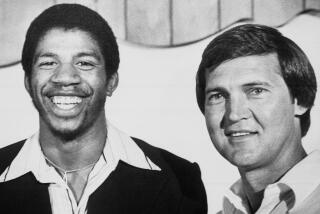THE TIMES POLL : Johnson Case Raises AIDS Concerns if Not Caution
- Share via
Concern about AIDS appears to have increased in the wake of Earvin (Magic) Johnson’s announcement that he is infected with the AIDS virus, but it is unclear whether that concern is altering people’s sexual habits, according to results from a new Los Angeles Times Poll.
Nearly one-third of those interviewed in the poll of 1,709 adult Americans nationwide said they were very concerned about their own risk of getting AIDS--up from one-fifth in Times polls during the mid- and late 1980s and from one-fourth in another organization’s poll in May.
Twenty-three percent said they had changed their sexual behavior because of AIDS fears, including higher percentages of young people, singles and blacks. However, these levels were barely changed from those found in polls done before Johnson’s announcement.
While the poll found that an extraordinarily high percentage of those surveyed--99%--had heard or read something about Johnson’s announcement, it also found Americans torn over what lessons to draw from his case:
* Forty-six percent agreed with the statement that all major league athletes should be required to take an AIDS test before being allowed to join a team, while 49% disagreed and 5% said they were unsure.
* Fifty-one percent agreed with the statement that Johnson “should have known better and now he is paying the price,” while 39% said they felt that the 32-year-old former star of the Los Angeles Lakers “is an unfortunate victim of chance.”
* Forty-nine percent said they thought the principal AIDS-prevention message for young people should be to learn safer sex practices before having sex. Forty-five percent said the message should be to abstain altogether.
“(Johnson’s announcement) made me realize that AIDS doesn’t discriminate and that if someone such as Magic can get it, then just think of poor me,” said Kim Scott, a 21-year-old student in Montgomery, Ala., who participated in the poll.
Johnson announced Nov. 7 that he was retiring from basketball because he had tested positive for the human immunodeficiency virus (HIV). He has stated since then that he became infected through heterosexual promiscuity.
Experts in AIDS prevention have viewed the news as a turning point in the war against the disease--powerful evidence that everyone is at risk. They especially hoped that minority groups and young people, who are increasingly affected, might take Johnson’s example to heart.
Several experts said Tuesday that they were heartened by some of the poll’s results. Dr. Mervyn F. Silverman, president of the American Foundation for AIDS Research, said he was particularly encouraged by the finding that 99% of those polled had heard about Johnson.
“If we can have someone who commands that much attention speaking out on these issues, it can have a tremendous effect,” Silverman said. “The fact that 99% knew what happened, I think, has the potential to be very important for his getting the message across.”
Dr. Mark Smith, a vice president of the Kaiser Family Foundation, observed that while more than half said they believed Johnson “should have known better and . . . is paying the price,” 68% nevertheless thought he would make an excellent or good role model for young people.
In addition to the unusually high level of public awareness about Johnson, the poll found that more than one-quarter of those interviewed said they were following the story very closely and nearly half said they were following it somewhat closely.
Those levels of interest are comparable to those reported earlier this year in polls about interest in the failed Soviet coup and in law professor Anita Hill’s sexual harassment charges against Clarence Thomas, the U.S. Supreme Court nominee.
The people polled were asked initially, before the subject of Johnson was raised, how concerned they were about getting AIDS. Overall, 32% described themselves as very concerned and 22% as somewhat concerned.
Those levels are up from previous Times polls in 1985, 1987 and 1989, when about 20% described themselves as very concerned in a similarly worded question. A nationwide poll by the Roper Organization in May found that 27% said they were very concerned and 21% were somewhat concerned.
Concern was higher among men than among women in the new Times poll. It has long been higher among blacks than among whites. It also appears to be higher among single people and young people.
But when asked if they had changed their sexual behavior, only 23% of those questioned said they had. Seventy-five percent said they had not. A New York Times-CBS News poll in June found that 20% of adults said they had changed their sexual habits because of AIDS.
When asked specifically about the impact of Johnson’s announcement, 41% said it had increased their concern and 14% said it had made them more cautious--figures that indicate a greater degree of change than the answers to questions asked before Johnson was mentioned.
Eleanor Singer, a senior research scholar at the Center for the Social Sciences at Columbia University and a specialist in polling, said such seeming contradictions are not uncommon. People often give the answers they think pollsters want to hear.
“You often see this when you compare (actual) behavior and responses,” Singer said. “The likelihood is that, in fact, very little change has taken place.”
There was, however, evidence of significant behavior change among men, young people, singles and blacks--groups that AIDS-prevention specialists hope to target. For example, 51% of single people interviewed and 44% of blacks said they had changed their habits.
“One of the points here is that people have already done a lot of changing,” said John Brennan, director of the Times poll. “It’s clear that there are a lot of people who have altered their sexual behavior before this.”
The split vote on whether professional athletes ought to be tested for the AIDS virus differs significantly from public opinion on testing some other groups. Polls suggest that most Americans favor testing health care workers, food service workers and all hospital patients.
Those interviewed were also almost evenly split on whether Johnson’s message should be safer sex or abstinence--a finding that Silverman said “speaks well to the fact that there is more than one option and that all the options ought to be provided.”
Fifty-six percent of men polled favored the safer-sex message, while 53% of women opted for abstinence.
How the Poll Was Conducted
The Los Angeles Times Poll interviewed 1,709 adult Americans nationwide, by telephone, Nov. 21 to 24. Telephone numbers were chosen from a list which includes all telephone exchanges in the United States. Random-digit dialing techniques were used to ensure that listed and unlisted telephone numbers had an opportunity to be contacted. Results were adjusted slightly to conform with census figures on variables such as sex, race and national origin, age, education and household size. The margin of sampling error for percentages based on the total sample is plus or minus three percentage points. The error margin for subgroups may be somewhat higher.
The Times Poll: AIDS and Magic Johnson
One in three Americans are very concerned that they may get AIDS; almost one in four have changed their sexual habits because they fear the disease. Concern over AIDS and changes in sexual behavior are noticeably higher among young people, blacks and singles.
% Very Concerned % Changing About Getting AIDS Sexual Habits All Americans 32% 23% Men 34% 28% Women 30% 18% Age 18-29 43% 45% Age 30-44 27% 20% Age 45-64 32% 12% Age 65 and over 23% 8% Whites 26% 17% Blacks 66% 44% Singles 45% 51% Single men 49% 54% Single women 40% 47% Singles age 18-39 46% 55%
The public is divided on whether Magic Johnson’s principal message to youth should be safer sex or no sex at all. More men, young people and singles support a safer-sex message while women and the elderly tend to favor abstinence.
Learn to Abstain From Practice Sex Until Safer Sex Married All Americans 49% 45% Men 56% 36% Women 42% 53% Age 18-29 59% 34% Age 30-44 59% 34% Age 45-64 40% 54% Age 65 and over 28% 65% Whites 48% 45% Blacks 49% 48% Singles 61% 32% Single men 71% 21% Single women 52% 42% Singles age 18-39 64% 28%
NOTE: Numbers may not add up to 100% because some answers are not displayed or because of “don’t know” responses.
More to Read
Go beyond the scoreboard
Get the latest on L.A.'s teams in the daily Sports Report newsletter.
You may occasionally receive promotional content from the Los Angeles Times.










